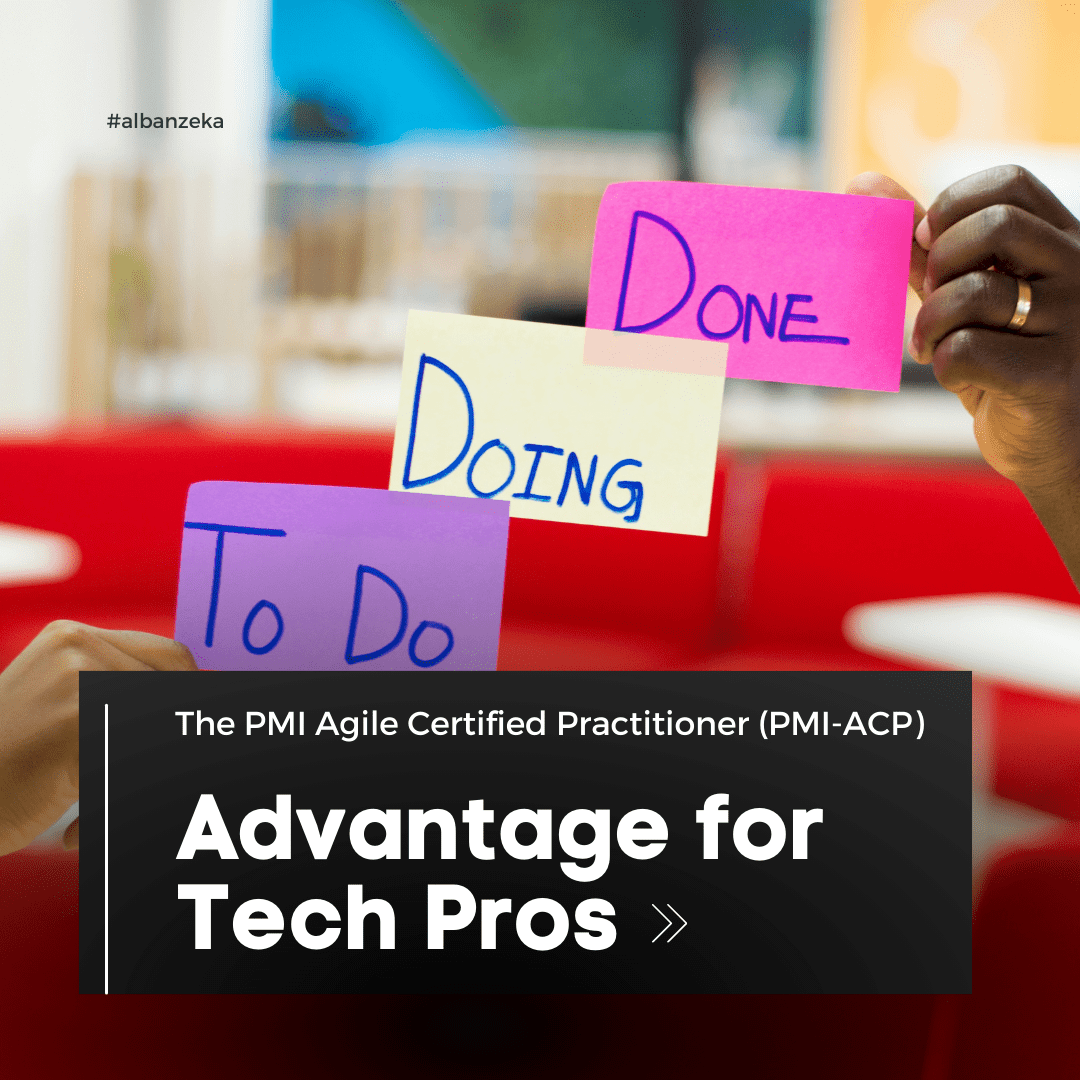Why Agile Matters: Understanding Its Impact on Tech Projects
Agile methodologies have revolutionized the way tech projects are managed, offering a flexible and adaptive approach that caters to the dynamic nature of software development. Embracing Agile isn’t just a trend; it’s a game-changer for tech teams worldwide. Here’s why Agile matters, its profound impact on modern tech projects, and why becoming a PMI Agile Certified Practitioner will make you an exceptional asset for any tech team.
Driving Innovation and Collaboration
Agile encourages collaboration among cross-functional teams, fostering creativity and innovation in tech projects. Moreover, by breaking down silos and promoting open communication, Agile empowers team members to share ideas, brainstorm solutions, and collectively tackle challenges. This collaborative environment fuels creativity, leading to the development of innovative tech solutions that meet the evolving needs of users.
Responding to Change with Agility
In today’s fast-paced tech landscape, change is inevitable. Agile equips tech teams with the agility to adapt quickly to changing requirements, priorities, and market conditions. Unlike traditional waterfall methodologies, Agile embraces change as a natural part of the development process. This flexibility allows teams to pivot, iterate, and refine their approach in response to feedback, emerging trends, and shifting business objectives.
Delivering Value Incrementally
One of the core principles of Agile is the delivery of working software in short, iterative cycles known as sprints. This incremental approach enables tech teams to deliver tangible value to stakeholders early and often, rather than waiting until the end of a lengthy development cycle. Also, by prioritizing features based on user feedback and business value, Agile ensures that tech projects deliver maximum value with minimal waste.
Empowering Tech Teams with PMI Agile Certified Practitioner (PMI-ACP) Certification
Achieving PMI Agile Certified Practitioner (PMI-ACP) certification empowers tech professionals to harness the full potential of Agile methodologies in their projects. By mastering Agile principles, practices, and tools, PMI-ACP-certified practitioners can lead Agile teams with confidence, drive continuous improvement, and deliver exceptional results. Furthermore, with PMI-ACP certification, tech professionals position themselves as Agile champions, equipped to navigate complex tech projects with ease and efficiency.
In summary, Agile methodologies play a vital role in shaping the success of tech projects by promoting innovation, adaptability, and value delivery. By embracing Agile principles and pursuing PMI Agile Certified Practitioner (PMI-ACP) certification, tech professionals can elevate their skills, enhance their career prospects, and make a significant impact in the dynamic world of technology.
Overview of the PMI Agile Certified Practitioner (PMI-ACP) Certification
What is PMI-ACP Certification?
PMI-ACP certification is a globally recognized credential offered by the Project Management Institute (PMI) for professionals who demonstrate proficiency in Agile principles and practices. Further, it validates your expertise in Agile methodologies, including Scrum, Kanban, Lean, and more, making you a sought-after asset in today’s Agile-driven tech landscape.
Benefits of PMI-ACP Certification
Unlocking PMI-ACP certification opens doors to a world of opportunities in the tech industry. By becoming a PMI-ACP-certified practitioner, you gain:
- Enhanced Career Prospects: PMI-ACP certification showcases your Agile proficiency to employers, increasing your chances of landing high-paying roles in tech companies.
- Increased Credibility: Earn the trust and respect of your peers and stakeholders by demonstrating your commitment to continuous learning and professional development.
- Expanded Skillset: Master Agile methodologies and best practices, empowering you to lead Agile teams with confidence and deliver successful tech projects.
How to Become PMI-ACP Certified?
Becoming PMI-ACP certified is within your reach. Here’s a step-by-step guide to earning your PMI-ACP certification:
- Meet the Eligibility Criteria: To qualify for PMI-ACP certification, you need a secondary degree or higher, 21 hours of Agile education, and at least 12 months of general project experience.
- Prepare for the Exam: Study Agile methodologies, tools, and techniques covered in the PMI-ACP exam outline. Utilize study resources like practice exams, study guides, and online courses to prepare effectively.
- Pass the PMI-ACP Exam: Schedule and take the PMI-ACP exam at a Pearson VUE testing center or online. The exam consists of multiple-choice questions testing your knowledge and application of Agile concepts.
- Maintain Your Certification: Once certified, maintain your PMI-ACP credential by earning 30 Professional Development Units (PDUs) every three years through ongoing education and professional activities.
Hence, PMI-ACP certification is a valuable asset for tech professionals looking to excel in Agile project management. By obtaining PMI-ACP certification, you position yourself as a skilled Agile practitioner capable of driving innovation, collaboration, and success in tech projects.
Strategies for Mastering Agile Methodologies and Passing the PMI-ACP Exam
Are you ready to ace the PMI Agile Certified Practitioner (PMI-ACP) exam and become a certified Agile expert? Here are some tried-and-tested strategies to help you master Agile methodologies and pass the PMI-ACP exam with flying colors.
-
Understand Agile Fundamentals
First things first, familiarize yourself with the core principles and values of Agile. Understand concepts like iterative development, self-organizing teams, and continuous improvement. Certainly, knowing the fundamentals will provide you a solid foundation for your Agile journey.
-
Dive Deep into Agile Methodologies
Agile is more than just Scrum and Kanban. Explore various Agile methodologies like Lean, Extreme Programming (XP), and Dynamic Systems Development Method (DSDM). Each methodology has its unique principles and practices, so understanding them all will enrich your Agile toolkit.
-
Practice, Practice, Practice
The key to mastering Agile is practice. Engage in hands-on Agile projects, either at work or through volunteer opportunities. Also, apply Agile principles and techniques in real-world scenarios to gain practical experience and confidence in your skills.
-
Leverage Study Resources
Take advantage of study resources like books, online courses, and practice exams to supplement your learning. Invest in reputable study materials that cover the PMI-ACP exam content outline comprehensively. Also, practice exams are especially helpful for familiarizing yourself with the exam format and testing your knowledge.
-
Join Agile Communities
Connect with fellow Agile enthusiasts and practitioners through online forums, meetups, and professional associations. Engaging with the Agile community allows you to exchange ideas, seek advice and learn from others’ experiences. Also, it’s a great way to stay motivated and inspired on your Agile journey.
-
Develop Test-Taking Strategies
When it comes to exam day, be prepared with effective test-taking strategies. In addition, manage your time wisely, read each question carefully, and eliminate obviously incorrect answers. Further, don’t dwell on difficult questions; mark them for review and come back to them later if time permits.
-
Stay Calm and Confident
Lastly, stay calm and confident throughout the exam. Trust in your preparation and knowledge. Remember that you’ve put in the hard work, and you’re well-equipped to tackle the PMI-ACP exam. Keep a positive mindset, and believe in yourself—you’ve got this!
Altogether, by following these strategies, you’ll be well on your way to mastering Agile methodologies and passing the PMI-ACP exam with flying colors.
For more tips and tricks on how to pass both PMI-ACP exam and PMP Exam click here.

Career Opportunities and Growth Potential with PMI-ACP Certification in the Tech Industry
Are you a tech professional looking to level up your career? Consider obtaining the PMI Agile Certified Practitioner (PMI-ACP) certification to unlock a world of exciting career opportunities and growth potential in the ever-evolving tech industry.
-
Agile is the Future of Tech
Above all, in today’s fast-paced tech landscape, Agile methodologies have become the norm for project management. Companies across industries are adopting Agile practices to stay competitive and deliver products faster and more efficiently. By becoming PMI-ACP certified, you position yourself as a valuable asset to any tech team.
-
Demand for Agile Experts
As Agile continues to gain traction, the demand for certified Agile practitioners is on the rise. Hence, tech companies are actively seeking professionals who can lead Agile teams, drive innovation, and adapt to changing project requirements. With PMI-ACP certification, you’ll stand out from the crowd and attract lucrative job opportunities.
-
Career Advancement Opportunities
PMI-ACP certification opens doors to a wide range of career advancement opportunities in the tech industry. Whether you’re aspiring to become a Scrum Master, Agile Coach, or Project Manager, PMI-ACP certification equips you with the skills and credibility to take on leadership roles and drive organizational success.
-
Higher Earning Potential
As expected, certified Agile practitioners command higher salaries compared to their non-certified counterparts. According to recent studies, a Scrum Master holding a PMI-ACP certification earns on average 16% more than their uncertified peers. By investing in PMI-ACP certification, you not only enhance your skills but also boost your earning potential in the competitive tech job market. Click here for more interesting facts about the advantages of PMI-ACP certification.
-
Diverse Career Paths
With PMI-ACP certification, you’re not limited to a specific role or industry. Agile principles are applicable across various domains, including software development, IT, finance, healthcare, and more. Whether you’re interested in working for a tech giant, a startup, or a nonprofit organization, PMI-ACP certification opens doors to diverse career paths.
-
Continuous Learning and Growth
Obtaining PMI-ACP certification is not the end of your journey; it’s just the beginning. Agile is an ever-evolving discipline, and certified practitioners are expected to stay updated with the latest trends, methodologies, and best practices. Moreover, PMI-ACP certification demonstrates your commitment to continuous learning and professional growth in the dynamic tech industry.
-
Networking Opportunities
Finally, by joining the ranks of PMI-ACP certified professionals, you gain access to a vast network of peers, mentors, and industry experts. Engage with Agile communities, attend networking events, and participate in online forums to expand your professional network and stay connected with the latest developments in Agile and the tech industry. For more tips on Agile Management that every Pro-Tech needs click here.
In conclusion, with PMI-ACP certification, the sky’s the limit for your career in the tech industry. Embrace the opportunities, hone your Agile skills, and embark on a rewarding journey towards success and fulfillment.
